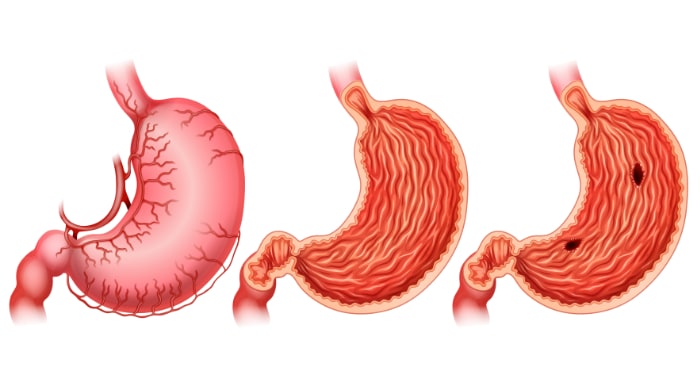
Having Irritable Bowel Syndrome (IBS) means experiencing frequent bloating, cramping, diarrhea or constipation and other digestive disturbances. Thankfully, Chef V has one effective recommendation for improving your IBS, courtesy of a Facebook post testimonial.
Unless you have IBS, it’s hard to empathize with someone who has it. It’s such a challenging condition not to mention a frustrating one.
On one hand, it’s one of the most commonly-diagnosed gastrointestinal disorders, affecting up to 50 million people in the U.S. alone. At the very least, roughly 15% of adults in the U.S. have IBS, but only 5% of people have been officially diagnosed.
Despite how pervasive IBS is, there is no single cure, root cause, or effective treatment.
If you don’t have IBS, consider yourself lucky and imagine how harrowing it must be to be totally in the dark when IBS symptoms strike! What if you’re out in public and can’t get to a bathroom in time?
IBS can severely impact your quality of life.
So let’s get to know this baffling condition…

What Is Irritable Bowel Syndrome?
As mentioned, IBS is one of the most common albeit underdiagnosed gastrointestinal disorders. Unlike Irritable Bowel Disease (IBD), which is caused by a functional and structural problem of the bowels, with IBS there’s nothing going on under the hood, so to speak, that explains the symptoms.
If there’s no noticeable abnormality in the gut, then what explains the frequent or chronic bloating, abdominal pain, constipation, diarrhea, gas and belching?
What Causes IBS?
Here’s a list of things that may cause IBS symptoms:
- Gut dysbiosis (This means not having enough friendly bacteria in the large intestine and too many unfriendly bacteria.)
- Poor gut-brain communication (The gut and brain should always be communicating effectively, just like in a healthy relationship.)
- Poor motility (This means having abnormal muscle contractions in the bowels.)
- Stress (Research studies like this one suggest a strong link between psychological stress and IBS. Stress is definitely a trigger.)
- Food intolerances (Dairy and gluten are major triggers of IBS symptoms.)
- Unresolved gut infections. (Did you travel to a developing country in the tropics? Maybe you picked up a parasite?)
Out of the 6 factors above, I think stress is the most prevalent because it can cause or exacerbate the other triggers.
For example, stress negatively impacts gut-brain communication (the Gut-Brain Axis); causes gut dysbiosis; can lead to poor motility and leaky gut; and can worsen inflammation-associated food sensitivity.

How To Manage IBS
In light of the fact that psychological stress is one of the biggest triggers of IBS symptoms, it helps to have a daily stress-management practice.
- Yoga.
- Meditation.
- Visualization exercises.
- Journaling.
- Immersing yourself in nature.
Do at least one of these practices every single day.
For IBS sufferers, the condition is frustrating and challenging because there is no one-size-fits-all approach to treatment like there is for let’s say high cholesterol. (Not that I’m endorsing statin drugs for everybody!)
For a dietary intervention, a low FODMAP diet may help. I won’t go too deep here but FODMAPS are basically different types of sugars that are difficult for people with IBS to digest.
I previously touched on FODMAPS here.
Basically, you’ll want to avoid foods that give most people gas. That means no:
- Broccoli and other cruciferous veggies (especially raw!)
- Beans and lentils
- Asparagus
- Apples
- Garlic
- Onions
- Dairy
- Cereal, bread, wheat products and other high-gluten foods
Drink Low FODMAP Leafy Greens
A lot of veggies, even though they are considered healthy, can trigger IBS symptoms. Cauliflower and cabbage: I’m talking about you!
What’s even more frustrating is that there are at least 3 subtypes of IBS: IBS-C, IBS-D, IBS-M. IBS-C is constipation-dominant; D is diarrhea-dominant and M is mixed.
What may trigger IBS symptoms in a person with IBS-D may not trigger symptoms in a person who is IBS-C dominant.
So wanna know the best way to get your daily dose of antioxidants—without freaking out your digestive system?
Try drinking them.
With Chef V Organic Green Drink, you’re getting the cleanest (no pesticides) low FODMAP leafy green veggies.
In a way, they’re pre-digested for you through the processing method of cold-blending.
As mentioned, IBS is caused in part by gut dysbiosis, meaning there’s not enough friendly bacteria in the gut.
The Chef V Green Drink advantage over conventional juice brands is that it’s never high-heat pasteurized.
That means that all the friendly bacteria is alive in the Green Drink.
And when you drink Green Drink every morning, you will supply your gut with the friendly bacteria it needs to manage IBS symptoms.
Manage IBS Symptoms With A Chef V 5 DAY Cleanse
If you want to take your IBS management to the next level, check out Tina’s recommendation below.
Tina has IBS and says that doing a 5 Day Cleanse (Chef V offers a 21 Day Detox which includes a cleanse period) has helped her get rid of gas and bloating.
With the 5 Day Cleanse you get everything you need to reduce IBS symptoms—without feeling deprived:
- 4 Green Drinks per day
- 2 vegan, low FODMAP protein shakes per day
- 1 DETOX SOUP for dinner per day
- Health resources to keep the results going and unlimited email support.
Learn more about CHEF V CLEANSE options here.
To your success in kicking IBS’ butt!
Love,
Veronica “V” Kress
Founder, ChefV.com








